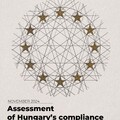Ahead of the 2024 municipal elections K-Monitor has taken a snapshot of the transparency of the largest municipal asset management companies in Hungary!
K-Monitor evaluated the disclosure practices of 31 municipal companies in the capital and in other major cities. The evaluation based on 27 criteria revealed which companies are performing the best, are the most transparent, or struggle with serious deficiencies. The assessment was shared with the municipal companies in October 2023, one month before the eventual publication of the results, to give them the opportunity to address shortcomings. Many of them made measurable progress during the short period.
K-Monitor is publishing the results and lessons learned from this company-level audit leading up to the transparency assessment of 29 significant municipalities. K-Monitor, together with Transparency International Hungary and Átlátszó.hu has launched the “This is the minimum!” transparency program for municipalities and have already conducted a mid-term review during the Spring of 2022. Currently, K-Monitor is in the process of finalizing the end-of-term review of municipalities, which is expected to be published at the end of February 2024.
The goal of publishing the rankings of municipal asset management companies as well as the municipalities themselves is to incentivize local actors to improve their transparency before the municipal campaign period starting in Spring 2024.
Why are asset management companies important?
The Hungarian government has significantly eroded the autonomy of Hungarian municipalities in the last decade by reducing their funding and competences. Today, effective local self-government is the privilege of larger cities that retain significant assets and locally sourced revenues. Since the central government does not reimburse all costs of mandatory local public services on a normative basis, these assets and revenues are often needed to cover operational costs at the expense of funding local urban development.
The situation incentivizes the handover of previously built infrastructure to the state for further operation and the privatization of existing assets for additional revenue. However, in the long run, selling off one's own assets is equivalent to self-liquidation. Without the flexibility provided by empty construction plots, real estate, revenue-generating investments, municipalities lose their ability to respond to the needs of local residents and solve local problems.
Municipal asset management companies are responsible for ensuring that existing assets are used strategically to achieve the set goals rather than being depleted. Effective management by these companies ensures that assets are not merely financial burdens but also sources of revenue, contributing to local policy-making and development. This requires fair, well-managed, and supervised operation that incorporates strategic goals. However, it often happens that municipality owned companies are a black box filled up with political appointees while decision-making (such as property sales) is confined to a well-informed inner circle, limiting local accountability.
In order to understand how much oversight local citizens can exercise, K-Monitor assessed the transparency of the largest municipal asset management companies of Hungary, scrutinizing them against a set of criteria that included the disclosure of operational documents and adherence to a rule-based, accountable framework.
K-Monitor selected 31 municipality owned asset management companies of districts of Budapest and county-level cities. However, they differ in a number of ways: some manage certain municipal assets as their own through asset management contracts, while others only provide services, utilities, conduct sales, development, and operation. Due to these differences, not all criteria examined were applicable to every company; this is indicated in the detailed evaluation behind the percentage ranking. Among the examined companies, there are companies with a staff of a few dozen as well as large holdings employing thousands of people and providing various public services.
The research delved deep into the disclosure practices of these companies, guided by the Freedom of Information Act and Government Decree 18/2005 (XII.27.). It assessed whether these companies provide access to crucial documents like founding documents, public budgets, or minutes of board meetings. The study also looked into the transparency of contracts and the positions of top managers, alongside the publication of performance indicators.
The findings were enlightening: while most companies met the basic criteria, and overall transparency improved, there was a noticeable disparity in performance. The top-ranking companies showcased exemplary practices in document accessibility and operational transparency, while the lowest scorers were marked by restricted access to critical information and limited public oversight.
What did K-Monitor look at?
The foundation of K-Monitor’s assessment was whether data on the operation and finances of publicly owned companies providing public services are published proactively as required by the Freedom of Information Act, and Government Decree 18/2005 (XII.27.). Based on these legal regulations, K-Monitor defined 27 criteria divided into six categories. The criteria of the survey are partly based on compliance with the law and partly on more stringent or specific requirements (e.g. on the method of publication, using lower thresholds for publication or the publication of certain regulations or strategies to make operations more transparent and user-friendly). The evaluation criteria have been developed in consultation with local decision makers, local NGOs and journalists in order to demand the level of transparency that would indeed make a difference. We also highlighted in the results whether a given company complies with the legal requirement to publish a list of its contracts above HUF 5 million (EUR 13.000) as even some large cities such as Pécs or Debrecen did not meet this basic requirement.
Of the six categories K-Monitor looked at, the first three examine the content of their websites to understand whether the companies provide access to the most important data on their operation, such as the company’s founding documents, the company’s public budget, and the minutes of board meetings. The other three sets of criteria assess whether the examined companies have disclosed data of high political and social interest. Such information includes contracts, as well as information on their top managers. K-Monitor also examined whether the companies publish performance indicators on their websites. Although this is not a legal requirement, the publication of indicators is important for the public and other companies involved in similar activities, as they allow better assessment of the companies' activities and efficiency.
Our assessment was conducted between late September and early October 2023. K-Monitor then sent the results to the relevant company managers and the mayor in charge, giving them nearly a month to address the shortcomings identified. In the majority of cases - 16 out of 31 companies - this was indeed done. Moreover, K-Monitor received detailed replies explaining what data has been additionally published and what further action to expect. Feedback from companies was taken into account until 3 November, and scores were updated accordingly.
It is a great pleasure to say that all companies improved during the assembly of this survey. Based on the data of the 31 companies, the average score of transparency was 58%, and the median was 60%, which meant that the majority of the companies were rated as "medium." However, the results were highly diverse: the top three companies were rated "excellent" or "very good," while the three companies at the bottom of the ranking were rated "insufficient".
While the fulfillment of the criteria does not in itself guarantee corruption-free or efficient management, it does provide a system to ensure an operating environment in which citizens, local representatives and the press can monitor and evaluate the company's operations and decisions.
Companies that achieved high ratings are transparent in their management and governance, providing the means for citizens and media to evaluate their performance. These companies also offer the possibility to report irregularities. Unfortunately, we did not only see well-functioning websites and online interfaces, but also examples of large companies spending millions of euros while using outdated, difficult to use, unsearchable, downloadable file formats. K-Monitor addressed these in additional comments.
The survey had a measurable impact on transparency: out of a total of 1072 points companies could collectively receive, they initially scored only 446 (41.6%). This increased to 547 points (51%) following the publication of more than 100 new datasets during the one month consultation period. That’s an improvement of nearly 10% points!
Big differences between the transparency of companies
According to K-Monitor’s survey results, the 13th District Public Service Corporation is the most transparent municipal asset management company among the major cities. The asset managers of Budapest Capital Municipality and the 8th district (Józsefváros) performed exceptionally well, along with significant improvements achieved by the 4th district (Újpest) and the 6th district of Budapest (Terézváros) companies, following feedback. These companies, surpassing a 70% result with minor shortcomings, nearly meet the expected standards and set an exemplary precedent for their peers with their own best practices.
Among the companies that achieved good results, the Szeged IKV deserves a special mention. Although they did not respond to our inquiry, their original evaluation already places them among the most transparent in the country and the most transparent among companies operating outside of the capital. Among these companies, the Szolnok SZOLLAK also deserves praise; K-Monitor received a detailed action plan during the feedback period. While Debrecen’s results are formally not bad, their list of contracts is not accessible, meaning that their asset management company does not meet the legal minimum.
Several companies in opposition-led major cities performed only average or below average, even though many representatives or mayors, such as Péter Niedermüller (7th district) and Ilona Szücsné Posztovics (Tatabánya), along with several local council members from Pécs and Óbuda, pledged to implement the 'This is the Minimum!' transparency program by Atlatszo.hu, K-Monitor and TI Hungary. It would appear that in these municipalities, transparency was merely an electoral promise, with no significant investment into progress.
The worst performance was delivered by the Csepel (21st district of Budapest) asset management company, which has not posted any data of public interest on its website since 2021. Among the districts of the capital, the 5th district's asset management company, notorious for its scandalous property sales, also received an exceptionally poor evaluation. The Békéscsaba asset management company also performed poorly, but K-Monitor received several promises from them to supplement the missing data sets.
The detailed evaluation including the criteria is available here.
Browsing through the detailed evaluation allows one to check the identified shortcomings broken down by data sets, and to find good practices that can be used for inspiration. Based on the feedback K-Monitor received, most company leaders are open to more transparent operations. Companies complained that IT related issues often hinder good disclosure, but K-Monitor also encountered organizations where the lack of information on legal requirements lead to shortcomings. We assume that in some cases the implicit or explicit pressure from the responsible municipality prevented the disclosure of certain datasets in order to avoid public scrutiny. We also found situations where there is simply no aspiration for transparency.
Transparency in companies is not a given, nor is it solely dependent on the possible extra effort from an appointed CEO. Decision-makers in the municipality can indeed expect and facilitate it. By adopting a policy on data publication (with deadlines and assigned responsibilities), the disclosure process can be structured even for a company, as data displayed due to an audit are worthless if they are not regularly updated. Internal training can help to ensure that those involved in the disclosure process understand exactly what and why they need to publish. By providing additional resources, IT-related problems (website, document management) can be addressed. Compliance with K-Monitor’s criteria system can be achieved by keeping the mandatory Disclosure List up to date and by publishing some important additional datasets on a separate disclosure list. Good practice can also be demonstrated by formulating asset management and corporate strategies to make it even more accessible to understand why and what the company is doing.
We believe that it is the duty of politicians delegated to corporate supervisory boards and municipal decision-makers to enforce these standards. Therefore, we primarily ask the representatives and politicians who have committed to implementing the 'This is the Minimum!' program to take action before the end of their term to fulfill the commitments of the program.
Címkék: english
Szólj hozzá!
A bejegyzés trackback címe:
Kommentek:
A hozzászólások a vonatkozó jogszabályok értelmében felhasználói tartalomnak minősülnek, értük a szolgáltatás technikai üzemeltetője semmilyen felelősséget nem vállal, azokat nem ellenőrzi. Kifogás esetén forduljon a blog szerkesztőjéhez. Részletek a Felhasználási feltételekben és az adatvédelmi tájékoztatóban.





